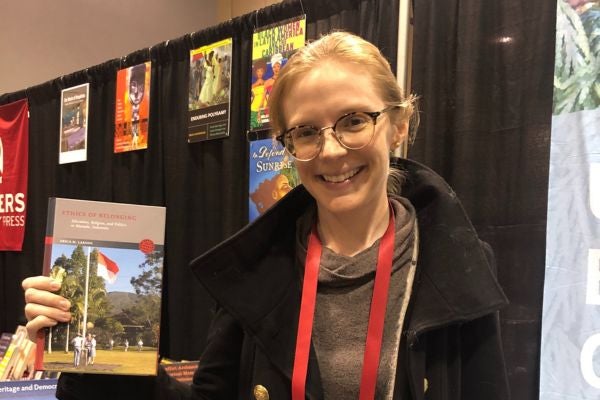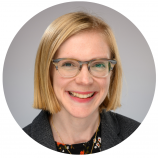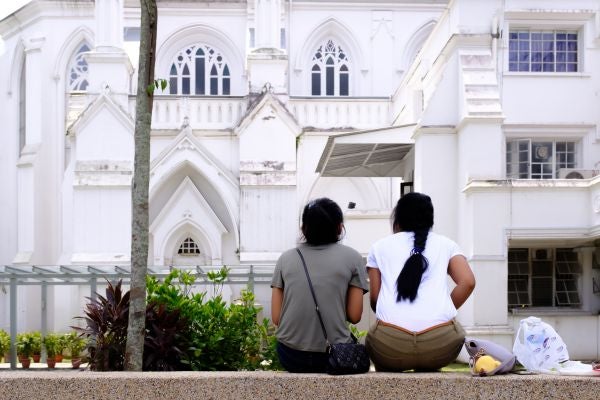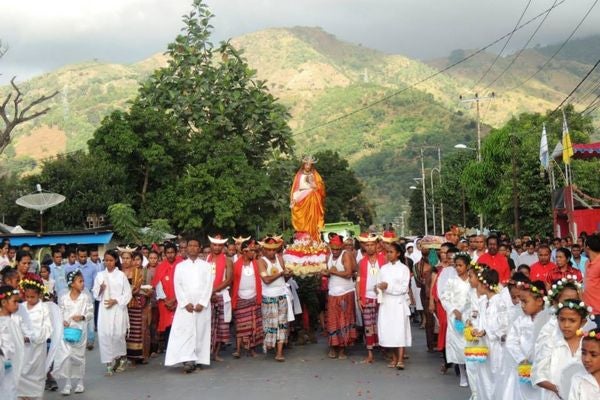In Conversation with Dr Erica M. Larson
Dr Erica Larson, Research Fellow in the Religion and Globalisation Cluster (Asia Research Institute, National University of Singapore) recently published her book, Ethics of Belonging: Education, Religion, and Politics in Manado, Indonesia (2023), which draws on ethnographic fieldwork in North Sulawesi to demonstrate how schools become important sites for deliberating the ethics and politics of religious coexistence. Through in-depth fieldwork at three secondary schools (a public high school, private Catholic boarding school, and public madrasah), an inter-religious “exchange” program among university students, and societal debates about religion and belonging, Larson’s research demonstrates not only how each of the schools promotes a distinct method for addressing diversity and a particular understanding of the relationship between religious and civic values, but also how ethical frameworks for approaching religious difference are channeled and negotiated through educational institutions, linking up with their broader political context and debates in the community.
Her book is an important contribution to the literature on pluralism and religious diversity in Indonesia and how local pedagogical efforts are integral towards the creation of a more inclusive society.
In this Q&A, we sit down with the author to ask several questions about how she arrived at her research, the opportunities and challenges she faced during her fieldwork in Manado, and her takeaway for Indonesia's religious future.

What motivated you to explore (or how did you chance upon) this topic on inter-religious relations? Were there specific gaps that drove your interest?
Since I began studying Indonesia, I have been fascinated by the puzzle of national cohesion across an archipelago of profound ethnic and religious diversity. Perhaps because I began my journey in Hindu-majority Bali and then spent time in Muslim-majority Central Java, (and later Protestant-majority Manado), articulations of religious identity and religion as a foundational component of social life have piqued my interest. In Indonesia’s transition to democracy, religion has been both a source and driver of civic life as well as a potential faultline which can be used to motivate communal conflicts. All of these broad questions and interests led me to focus more specifically on how approaches toward religious difference are socialized in a religiously plural society. In the book, I explore these questions about the place of religion in national belonging as ethical questions about inclusion and exclusion, aiming to work out how different kinds of deliberation unfold on the interpersonal, institutional, and public levels. Schools, in this approach, become a point of departure for looking at the different ethical frameworks that are channelled through them, and understanding their linkages to the public sphere.
Why Manado?
The city of Manado is an important place to study religious belonging and inter-religious relations in Indonesia for several reasons. In the early 2000s, as Indonesia was implementing processes of democratisation and decentralisation, ethno-religious conflicts broke out in several areas across the archipelago, including in many nearby provinces. There was real concern about conflict spreading to the city of Manado (and the province of North Sulawesi), but the region ultimately remained peaceful. This shapes contemporary identity and discourses about solidarity and “religious harmony” (kerukunan beragama) in a palpable way that made me extremely interested in conducting research there. I also think it is important to look at regions outside of Java, not for their anomalies, but for the way in which they can further our understanding of national belonging and religious identity in Indonesia.
These are scholarly justifications, but the original idea was suggested to me by a scholar from Manado who also happened to be my Indonesian language instructor in the United States. I had initially planned to do research in Java, but she convinced me that Manado has an important story to tell and put me in touch with local educators as I started my pilot research. I quickly realised what she meant and pivoted the focus of my research to education and religious belonging in North Sulawesi, a place that is known affectionately as bumi nyiur melambai, “the land of waving coconut trees.”

What was the most surprising or unexpected finding during your ethnographic research in Manado?
One of the most surprising turns in my research that ultimately helped clarify my findings came through talking to leaders of Christian militias and vigilante groups which have rebranded themselves as traditional (adat) organisations. At first, I questioned how these interviews relate to what is happening in schools, feeling a jarring disconnect between sitting in the classroom with teachers and students, and then talking to leaders of organisations in smoke-filled coffeeshops. But I remained convinced that it would all eventually make sense through this approach of following different ethical perspectives on religious coexistence. And it did. In understanding the way in which these groups foreground religious identity and approach religious difference, I realised that their stance might be more confrontational than the mainstream discourses about religious coexistence, but that the underlying assumptions were not so far removed from what I had heard from other public figures and seen elements of within schools.
Did you encounter any unique challenges in capturing the nuances at these schools, and in interacting with the students? Or perhaps in navigating the Indonesian school system?
The nuances at each of the schools which became the focus of my research (a public high school, a private Catholic boarding school, and a public madrasah) were quite pronounced. The distinctiveness at each of the schools is an important reminder about how it is not only the singular national curriculum which provides students with approaches toward religious difference, but is also related to the school policies and directives around religious worship, the way in which religious minorities are accommodated, and how ideas are presented by teachers inside and outside the classroom.
Ethnographic fieldwork necessarily requires the building of rapport with community members. I approached the administration at each school first to ask for permission to do research and began to speak with teachers to understand their approach and perspective on teaching about religious coexistence. This gave me valuable insight into how teachers translate and implement national curricular directive into a local context and how they themselves understand religious difference. However, spending too much time with the teachers also resulted in many students assuming that I was a new English teacher at the school, and therefore viewing me as an authority figure! This made it more difficult to approach students and talk to them in a more informal context, though I eventually developed strategies to do so (which to a large extent involved practising my “selfie” photography skills).

Finally, what do you see as an important takeaway for readers? And what do you think the challenge is for Indonesia’s religious futures?
The book demonstrates how two different frameworks for approaching religious difference are in ongoing tension in Manado, and how the scope of each is constantly being redefined on different levels through practices of deliberation. One framework is “aspirational coexistence,” where belonging is guaranteed by mutual recognition and dialogue, and there is a real striving toward a collective future. The other is “majoritarian coexistence,” in which the belonging of religious minorities becomes guaranteed exclusively by the goodwill of the majority. I hope that my approach to empirically locate these discourses and the practices they encode at different social levels (in the public sphere as well as among peers in a classroom) can speak beyond the local context of the study to provide insights about belonging and coexistence in various contemporary plural societies.
As for Indonesia specifically, the research also provides an interesting parallel to some cases of Islamic majoritarianism in Java or other Muslim-majority areas of Indonesia. Christians in North Sulawesi, as a majority in the province, remain extremely anxious about strategies to ensure they remain the majority, in ways that may ultimately undermine the aspirations toward religious coexistence that have become, to some extent, normative. While identity politics (especially with the upcoming presidential election) and their mobilisation of religious identities remain a major concern and threat, my findings ultimately challenge the idea that there has been an ongoing and uncontested hardening of religious boundaries. A focus on smaller-scale deliberations shows how religious identity and understandings of difference are contextually negotiated, and that these kinds of interactions matter.
Dr. Erica Larson's book, published with the University of Hawai'i Press, is now available.
The views expressed in this forum are those of the individual authors and do not represent the views of the Asia Research Institute, National University of Singapore, or the institutions to which the authors are attached.
Dr Erica M. Larson is Research Fellow in the Religion and Globalisation Cluster at the Asia Research Institute.
She has a PhD in Anthropology from Boston University and was previously Visiting Assistant Professor in Anthropology at Hanover College (USA). Dr Larson’s current research focuses on Indonesian students seeking higher education in Singapore as a “digital diaspora”, examining the way in which social media usage is intertwined with academic aspirations, religious practice, and various forms of mobility. She is also launching a collaborative, multi-sited project researching Indonesian youth active in religious organisations.









